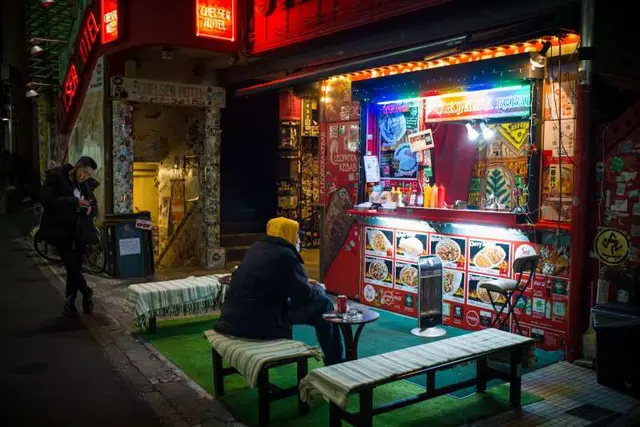Japan is set to expand its state of emergency beyond the Tokyo region to encompass the country’s other main economic hubs, as it battles to contain a surge in coronavirus cases.
The government will announce the extension of the emergency area to seven additional prefectures later Wednesday, according to Economy Minister Yasutoshi Nishimura, after a panel approved the measure. Prime Minister Yoshihide Suga is set to speak at a meeting of his virus task force before giving a news conference at 7 p.m. in Tokyo.
Together with the capital and three neighboring prefectures that came under the state of emergency last week, the areas account for more than half of the nation’s output. The expansion would further strengthen the likelihood of the world’s third-largest economy slipping back into reverse this quarter.
Customers in front of a kebab stand in Shibuya last Friday.
Widening the reach of the emergency is also likely to fuel criticism that the government didn’t start its second state of emergency quickly or extensively enough and that its provisions aren’t stringent enough to contain record levels of infections.
“There’s no question that the economy will contract in the first quarter,” said economist Hiroaki Muto at Sumitomo Life Insurance Co. “Nobody thinks they can end the state of emergency in a month. I think it will take at least a full two months.”
The prefectures set to be added include the business and manufacturing hub of Osaka along with nearby Kyoto and Hyogo, and the industrial heartland of Aichi, which is home to Toyota Motor Corp., plus bordering Gifu. The other areas are the prefecture surrounding and including Fukuoka, the largest city in the southern island of Kyushu, and Tochigi, located north of Tokyo.
The 11 areas account for about 60% of the economy’s total output, according to government data. The emergency in the additional areas is set to start Thursday and end on Feb. 7, in line with Tokyo, Nishimura said.
While the emergency is intended to send a strong message in a country that can’t legally enforce the type of lockdowns seen in other nations, the Tokyo region has yet to see the same level of impact on people’s behavior as during the first declaration last spring.
The number of people moving through business and shopping districts in central Tokyo since the latest emergency was declared is down considerably from a typical year, but the decline this time is much less than the drop in April during the first state of emergency, according to an analysis of GPS data provided by Agoop.
Tokyo reported cases under 1,000 for the first time in more than a week on Tuesday, with 970 new infections, though testing and reporting are likely to have been impacted by a long weekend. Serious cases in the capital, defined as those on a ventilator or ECMO machine, jumped to a record 144, with 250 beds allocated to such cases.
Japan has seen by far the fewest infections of any Group of Seven country, recording about the same number of infections in the past year as the U.S. has tallied on certain days in January.
The surge in Japan is already weighing on sentiment. The mood among main street merchants and other consumer-facing businesses like store owners and taxi drivers slid in December to the lowest since May, a government survey showed Tuesday. The Bank of Japan is also likely to consider cutting its economic assessment for the fiscal year ending March when it meets next week, according to people familiar with the matter.
Japan Merchants’ Mood Falls to Lowest Since May as Virus Spreads
Critics have questioned whether the second state of emergency is sweeping enough to contain the spread of the virus. While authorities have called for lighter restrictions than last year to limit the economic damage, the measures risk sending mixed messages to a public that is struggling with pandemic fatigue. Department stores, cinemas and gyms remain open, while bars and restaurants have only been asked to close after 8 p.m.
Health Minister Norihisa Tamura addressed the issue on Tuesday. “Of course it’s not OK for people to drink and get rowdy during the daytime,” Tamura said at a regular briefing. “We want to people to use their common sense.”
Last year, the government expanded the emergency designation to the entire nation shortly after starting with a handful of prefectures including Tokyo. That led to a record economic contraction in the quarter through June. The economy has only recouped about half of its losses so far.
(BLOOMBERG)
 简体中文
简体中文

